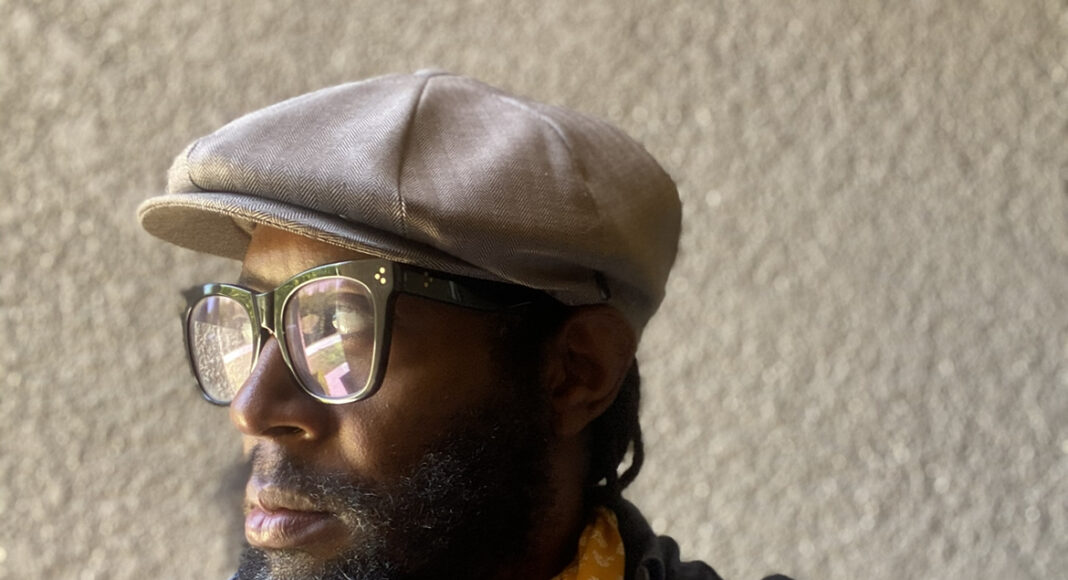In 2014, after 11 years on the road performing poetry, I moved back to San Jose on a permanent basis. Immediately, I began returning to the San Jose Poetry Slam, then held at the now defunct Fahrenheit Ultra Lounge.
I hadn’t seen Tshaka Campbell in years and was surprised and elated to run into him at the slam. Prior to that meeting, we had only seen each other at somewhat legendary poetry cathedrals: Justice League in San Francisco, Da Poetry Lounge in L.A. and the Nuyorican Poets Cafe in the Lower East Side.
Seeing Tshaka Campbell at our small, but ultra poetry slam, was akin to seeing George Carlin at Rooster T Feathers, or Joey Chestnut waiting for a hot dog at your barbecue grill. To hear him say that he had moved to San José triggered in me a new, visceral reaction—poetry in this valley has a fighting chance.
Earlier this month, the County’s Board of Supervisors appointed Campbell to the post of Santa Clara County Poet Laureate, the seventh person to hold the honor. For the next two years, the title posits him as the county’s go-to guide for all things poetry.
Born in London, Campbell spent the early part of his childhood in England. At eight years old, he and his family immigrated to the United States, settling in Brooklyn. He found writing at a young age and quickly developed a prolific habit.
Most writers who fall in love with spoken word remember who their Cupid was, and when the arrow hit. For Campbell, it was New York performance poet Ainsley Burrows who, in the mid-90s, pulled words off the page and brought them to visceral life.
Enter Tshaka Campbell: Performance Poet.
As a writer, Campbell is influenced by his locality—London, New York and Los Angeles have all impacted his performance and writing styles. Life in San Jose over eight years can do that as well.
“There’s more pause in my poetry, a lot more space,” he says. “My work breathes differently than it did before. San José has given me such a shelter to evolve and cocoon.”
However, there remains the constant weight of being a Black writer in America.
“It’s a lot. It’s like sifting through what is anger and what is productive writing,” Campbell says, before adding that “angry writing is just fine as well.”
“When there was yet another shooting, I was like, ‘I’ve already written these poems—I’ve got like 60 of these poems already. I don’t want to write it again.’ Now of course, a week later, I feel like I need to write to exercise.”
As a poet, and a performer, Campbell’s works are invaluable. He delivers his words with urgency, a beautiful disquietude to ensure they echo well into the future.
As a husband and a father, he is acutely aware of how rough the world can be. However, when his ten year-old daughter attempted to prevent him from leaving the house, it alerted him to just how aware she was of the dangers they both face.
“I want her to have the fire, because I don’t want her to get stepped on,” Campbell says. “I want her to know what’s happening. No matter where she goes and whoever she’s with, she’s always going to be a Black woman, a Black girl, regardless—and that’s what they’re gonna see first. I want her to understand that, but I don’t want her to be dictated by that.”
He says she also has a newfound appreciation for sarcasm, something that brings him a lot of inspiration. “She’s so much fun!” he laughs.
As poet laureate, one of Campbell’s initiatives is In Our Words, which will give the county’s youth an opportunity to share their own experiences and perspectives regarding the pandemic era.
“Because of this time period, I want to have kids exercise what these last three years have been for them. To find a channel for them to talk about it in terms of poetry,” Campbell said.
In this valley, spaces for poetry come and go. Tshaka Campbell is here because he saw the potential to make a home for his family and his poetry; he’s staying because poetry is another means of belonging.



